English CBSE Class 12 NCERT Flamingo Chapter 7 The Interview Solution of Extra Questions and Answers – Extract Based Questions, Short Answer Questions and Long Answer Questions
THE INTERVIEW
(Extra Questions)
Multiple Choice Questions
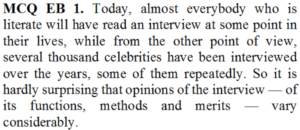

(i) Which of the following cannot be used to replace the word ‘Today’ in above extract?
(a) These days
(b) Those days
(c) Nowadays
(d) In this age
(ii) Based on the above extract, please select the correct option –
Assertion: Opinion about the interview vary considerably
Reason 1 – Many people read interviews
Reason 2 – Many people have been interviewed
(a) Reason 1 is a valid reason for the assertion
(b) Reason 2 is a valid reason for the assertion
(c) Neither Reason 1 nor Reason 2 is a valid reason for the assertion
(d) Both Reason 1 and Reason 2 are valid reasons for the assertion
(iii) Which of the following sentence incorrectly uses the phrase ‘over the years’?
(a) I have achieved excellence gradually over the years
(b) Messi, over the years, has grown as a reliable player.
(c) In Antarctica winter is spread over the years.
(d) The air travel has become a lot safer over the years.
(iv) Which of the following is implied by ‘So it is hardly surprising that opinions of the interview vary considerably.’
(a) It is accepted that opinion about interview would be different.
(b) It is expected that opinion about interview would be different.
(c) It is a surprise that opinion about interview would be different.
(d) It is hard that opinion about interview would be different.
(v) Which of the following cannot be inferred through the extract?
(a) Many people are literate
(b) Many people are celebrities
(c) Many people face interview many times
(d) Many people agree during interview
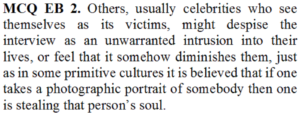

(i) According to extract what was considered equivalent to stealing a person’s soul?
(a) Interviewing
(b) Despising
(c) Photographing
(d) Victimizing
(ii) According to the extract which of the following is not true about ‘others’?
1. Usually they are celebrities
2. They feel interview increases their popularity
3. They want to avoid interference in their lives
4. They consider themselves as victims
5. They like to give interview
(a) 1 and 2
(b) 3 and 4
(c) 4 and 5
(d) 2 and 5
(iii) Which of the following correctly represents the phrase ‘just as’?
(a) Truthful to
(b) Justified at
(c) Similar to
(d) Point at
(iv) The theme of the extract is to talk about –
(a) Positives of interview
(b) Advantages of interview
(c) Negatives of interview
(d) Comparison of interview
(v) Which of the following is not synonym of ‘primitive’?
(a) Ancient
(b) contemporary
(c) Antique
(d) Elementary
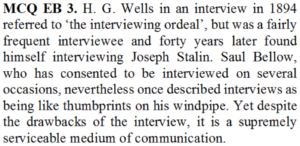

(i) Which of the following best fits the theme of the last line of above extract?
(a) We have some good moments and some bad moments in life
(b) Every coin has two faces.
(c) When benefits outweigh disadvantages, it could be considered acceptable
(d) Every mission can be accomplished through more than one way.
(ii) Which of the following is not implied by the expression ‘being like thumbprints on one’s windpipe?
(a) Being in a state of puzzle
(b) Being is a state of uneasiness
(c) Being in state of conviction
(d) Being in a state of discomfort
(iii) Who according to the extract had not been an interviewer as well as interviewee?
(a) H. G. Wells
(b) Joseph Stalin
(c) Saul Bellow
(d) All the above
(iv) A word ‘consented’ has been used in the extract. Which of the following word can replace this word?
(a) constructed
(b) agreed
(c) congratulated
(d) denied
(v) Based on the extract please select the most appropriate option in reference to the two statements given below.
Statement 1 – One may change one’s thoughts with passage of time
Statement 2 – Repetition may not generate confidence.
(a) Both statements are false and are not related to each other
(b) Both statements are true and Statement 2 is justification of statement 1.
(c) Both statements are false and have same inference
(d) Both statement are true and these do not derive similar inference.
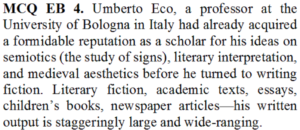

(i) Which of the following phrase as used in the extract indicate that Umberto Eco had written on various topics?
(a) formidable reputation
(b) literary interpretation
(c) wide ranging
(d) staggeringly large
(ii) Based on the following statements please choose the correct option?
Assertion: Umberto Eco is a professor at the University of Bologna in Italy
Statement 1: Umberto Eco is well known across the world for his knowledge
Statement 2: Umberto Eco has written on various topics
(a) Both statements can be inferred from the assertion
(b) Statement 1 can be inferred from Assertion and Statement 2 correctly explains the Statement 1
(c) Statement 1 can be inferred from Assertion but Statement 2 cannot be inferred.
(d) None of the statements can be inferred from the assertion
(iii) According to extract which of the following is / are not correct about Umberto Eco?
1. He had a strong reputation as person of knowledge
2. He began writing before becoming a professor
3. He has written on several topics
4. He is a voracious writer
5. His thoughts on study of signs are wildly respected
(a) 1 and 4
(b) 2 and 3
(c) 3 and 5
(d) 2 and 5
(iv) What, in your opinion, is the theme of the extract?
(a) Recommending achievements of Umberto Eco
(b) Umberto Eco has worked in several institutions
(c) Breadth of talents of Umberto Eco
(d) Realizing of achievements by Umberto Eco
(v) Which of the following does not carry the similar meaning of ‘turned to’ as conveyed in the extract?
(a) Let us turn our attention to important aspects.
(b) There was a ‘Y junction’ on the road and I turned to right.
(c) Rahul turned to coaching after retiring as a player.
(d) My grief soon turned to anger.
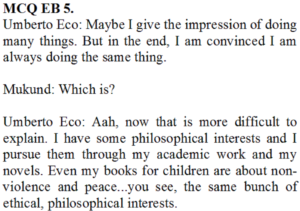

(i) Which of the following is not implied by the first para of the extract?
(a) The speaker is a humble person.
(b) The speaker is recognized as person of many virtues.
(c) The world does not appreciate a doer.
(d) The speaker too has some convictions.
(ii) Which of the following best fits about the intention of two words spoken by Mukund?
(a) Prompt Umberto Eco to say more about his works.
(b) Question correctness of what Umberto Eco has already narrated.
(c) Deny any deviation from the topic of discussion.
(d) Implicate Umberto Eco into an enquiry.
(iii) What does Umberto Eco find more difficult to explain?
(a) Wide range of his works
(b) Variety of his works
(c) Similarity of his works
(d) Popularity of his works
(iv) Umberto Eco persists his philosophical interests through
(a) Academic works
(b) Novels
(c) Children’s books
(d) All the above
(v) Which of the following best represents the word ‘bunch’ as used in the extract?
(a) flock
(b) group
(c) wreath
(d) batch
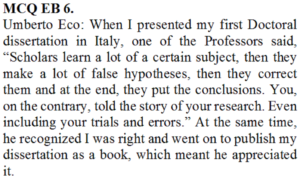

(i) A Doctoral dissertation would usually result into a degree of
(a) MBBS
(b) Dr.
(c) Ph. D.
(d) none of the above
(ii) Please arrange following activities in a sequence usually followed by scholars for their Doctoral dissertation and choose the correct option.
1. Draw the conclusion
2. Make lot of false hypotheses
3. Learn a lot
4. Correct hypotheses
(a) 1,2,3,4
(b) 3,2,4,1
(c) 2,4,1,4
(d) 4,1,3,2
(iii) In the above extract, which of the following expression can replace the phrase ‘on the contrary’ without altering the meaning of the sentence?
(a) on the other hand
(b) on the board
(c) on the edge
(d) on the second thought
(iv) ‘he recognized I was right’. In this part of the sentence to whom does ‘he’ and ‘I’ refer to respectively
(a) Umberto Eco and professor
(b) Professor and Umberto Eco
(c) Umberto Eco and scholar
(d) None of the above
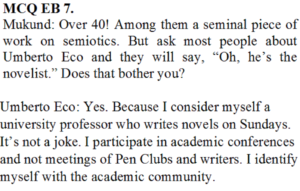

(i) What does bother Umberto Eco?
(a) People consider him a professor
(b) Most people consider him a novelist
(c) He is being asked difficult questions
(d) His work on semiotics
(ii) Please evaluate following two statements in the context of the extract and then choose the most appropriate option given below.
Statement 1 : Umberto Eco gives more attention to his academic works
Statement 2 : Umberto Eco is more popular as a novelist.
(a) Both statements are false
(b) Statement 1 is true but statement 2 cannot be inferred from the extract
(c) Statement 2 is true but statement 1 cannot be inferred from the extract
(d) Both statements are true and can be inferred from the extract
(iii) What does Umberto Eco not consider a joke?
(a) writing novel
(b) being a professor
(c) being both a professor and a writer
(d) writing novels during free time available from academic works
(iv) Based on the contents of the extract, Umberto Eco is likely to engage in which of the following activity?
(a) Inaugurate two day literary club festival of your school
(b) Be a keynote speaker at the ‘budding writers’ seminar’
(c) Be a keynote speaker in a seminar to discuss curriculum for college students
(d) Become the honorary President of Writers’ Association of his country.
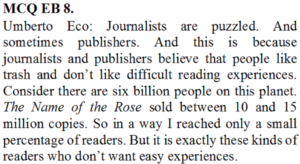

(i) Who according to Umberto Eco are a group of confused people?
(a) publishers
(b) journalists
(c) both (a) and (b)
(d) none of the above
(ii) From the extract it can be inferred that Umberto Eco holds an attitude of ________towards journalists and publishers. Which of the following word is the most appropriate option to fill in the blank of this sentence.
(a) appreciation
(b) contempt
(c) disrespect
(d) ignorance
(iii) What is the approximate number of readers who do not prefer easy reading experience?
(a) six billion people
(b) 10 million people
(c) 15 million people
(d) 10 to 15 million people
(iv) Which word in the extract has been used as synonym of ‘imagine’?
(a) trash
(b) consider
(c) kinds
(d) exactly
(v) Which word is the most appropriate option to fill the blank space of the following logical sequence?
difficult: easy :: trash: _______
(a) bin
(b) litter
(c) ruin
(d) treasure
Extract Based Questions


(i) What is being referred to as ‘it’ in above extract?
(ii) When is ‘it’ considered as ‘a source of truth’?
(iii) When is ‘it’ considered ‘an art’?
(iv) Which word in extract indicates a connotation of ‘possibility’?
(v) Which word in extract can be replaced by the word ‘outrageous’?


(i) To whom does the word ‘their’ refer to in above extract?
(ii) Which word of the extract can be replaced by the word ‘reproachful’?
(iii) The incident referred to by Caroline most likely occurred in which century?
(iv) In your opinion, whom did the reporters want to interview?


(i) If you were to write ‘These days’ in one word, what would that word be?
(ii) According to extract, what is best method to understand about a person?
(iii) According to the extract what can you infer about popularity of interview – increasing or decreasing?
(iv) Based on the above extract, Denis Brain is most likely to be an interviewee or an interviewer?


(i) What does the word ‘English’ imply in this extract?
(ii) Other than writing novels, what could have been the profession of David Lodge?
(iii) To whom does the words ‘one man’ refer to?
(iv) Which word in the extract is antonym of ‘repeatedly’?


(i) Which word in the extract can be replaced by the word ‘noticeable’?
(ii) What does the speaker think could have come naturally to the listener?
(iii) Can it be inferred from the extract that one can develop his own style of writing? Which word of the extract supports your answer?
(iv) Please write three words used for the regular academic style?


(i) When did the speaker discover his own style of writing book?
(ii) According to the extract, to what style, the story telling has been equated to?
(iii) What according the extract is the writing style of the speaker?
(iv) Which word of the extract can be replaced by the word ‘realised’?


(i) Can you infer from the extract about the ‘next question’?
(ii) What is the specialty of the novel The Name of the Rose?
(iii) The tone of the passage is of ‘appreciation’ or ‘criticism’?
(iv) Which word of the extract can be replaced by ‘investigates’?
Short Answer Questions – 30 to 40 words


Answer: Every literate person has read or listened to an interview at some point of time during their life time. And several thousands of people have been interviewed.
Since the interview is so widely prevalent among masses, it is natural to have different opinions.


Answer: Most celebrities think themselves as victims of interview. They hate interview and consider it as a ‘pepping Tom’ and an unsolicited interference in their life. They also feel that an interview decreases their dignity.


Answer: Lewis Carroll was afraid of interviews. He never agreed to give an interview. He was happy about this choice and narrated stories how, this way, he could successfully avoid would be acquaintances, interviewers and autograph seekers.


Answer: Rudyard Kipling had a derogatory attitude towards interviews. He considered these to be immoral, cowardly, vile, crime and an assault that deserved punishment.
But Kipling had himself interviewed Mark Twain couple of years ago.
Above explains the contrasting views of Kipling.


Answer: Saul Bellow had termed interviews as ‘thumbprints on his windpipe’.
Probably he was troubled by the interviewers and also got puzzled during the interviews.
This was the reason he coined the said term for interviews.


Answer: Dennis Brain thought that interview was the distinct method to know about a person. We get to know almost everything about a person when that person is questioned by another person. Nowadays an interviewer has an influence that was never available earlier.
Above are opinions of Dennis Brain about interview.


Answer: Umberto Eco was regarded a scholarly writer on semiotics. He wrote fictional books, academic books and literature, essays, children’s books, articles for newspapers and many more. His writings are of great variety. His famous novel is ‘The Name of the Rose’.


Answer: Umberto Eco explains that he has some philosophical interests and ethics. He pursues these through his novels and his academic works. Even while writing literature for children he writes about same ethical principles of peace and non-violence.
Thus goes his explanation.


Answer: Umberto Eco explains that similar to an atom, this world also has lot of empty spaces or ‘interstices’. These are time zones when we do not have anything to do.
Eco works in some of these ‘interstices’. Thus he is able to do more work than many others.


Answer: The routine academic style is depersonalised and it is usually boring and dry.
The style adopted by Umberto Eco, even for his scholarly works, has a playfulness and a personal touch too.
This is how two styles are compared by Mukund.


Answer: Umberto Eco submitted thesis for his first Ph. D. when his age was about 22.
Umberto Eco started writing novels when he was around 50. He has written five novels.


Answer: Roland Barthes was frustrated because he was an essayist not a novelist. Though he wanted to write novels also but never wrote a novel.
To avoid getting into such a trap, Umberto Eco simply started writing novel when he felt the urge to do so.


Answer: Umberto Eco believes that there are many people in the world who wish to read difficult narratives. There are also some people who do not want to always read easy readings.
Among these types of readers his novel has become popular. So he is not puzzled.


Answer: Umberto Eco says that many writers have written on medieval history. Had I written this novel ten years before or ten years later, its popularity could have been different.
He finally adds that success of a book is a mystery, nobody can predict it.
Long Answer Questions – 120-150 words


Answer: Umberto Eco is a professor at University of Bologna, Italy. He is considered an authority on Semiotics. He is respected for his works on literary interpretation and medieval aesthetics. He attends academic conferences but avoids Pen Club meetings.
He is creative in his works. He wrote his first doctoral research in a creative and unique style. His professor, impressed by his style, published the thesis as a book. His non-fictional writing and other scholarly works have a playful and personal quality about it.
He is humble. In spite of the great success of ‘The Name of the Rose’, he politely says that success of a book is always a mystery. He considers himself a University professor who writes on Sundays.
He is not afraid of making a new beginning. He believes in doing work rather than dreaming about it. He started writing novels at the age of 50. He utilizes time zones of ‘no-activity’ (empty spaces or interstices) for productive work.
Thus Umberto Eco is a scholarly academician and novelist who works creatively. His humility and ‘just do it’ attitude makes him a great personality.


Answer: Many celebrities feel themselves as victims of interview. They feel that an interview is an intrusion into their life and somehow diminishes them.
V. S. Naipaul feels that people are usually wounded by the interview and lose a part of them.
Lewis Carroll was so afraid of giving an interview that he never agreed for it. He thought avoiding interviews helped him avoid would be acquaintances and autograph seekers.
Rudyard Kipling believed that an interview is an offence against a person and an assault on a person. No respectable person would either give or take an interview.
In 1894, H.G. Wales had talked about difficulties a person faces during an interview. But he would frequently give interviews.
Saul Bellow described interviews as ‘thumbprints on his windpipe’.
Dennis Brian wrote that almost everything of importance reached us through one person asking questions to another person. Hence the interviewer commands a position of influence.
Above are opinion of celebrities mentioned in the chapter ‘The Interview’.


Answer: The Name of the Rose is widely perceived as a detective novel that also talks about reality, religious beliefs and middle age history. Umberto Eco is not puzzled by its success. On the contrary, he feels that journalists and publishers are puzzled. He says that people who do not like to experience an easy reading, have bought this novel.
Umberto Eco says that the publisher initially thought that the novel would sell around 3000 copies in US. Eventually the novel sold more than two million copies in US. World over the novel has sold more than 10 million copies.
In spite of huge success of his novel, Umberto Eco remains humble and polite. He says that success of any novel is a mystery. He thinks popularity of this novel would have been different had he written it ten years earlier or ten years later.
Thus we can conclude that Umberto Eco is truthful as well as humble about success of his novel.


Answer: Umberto Eco is a professor in University of Bologna, Italy. World over he is considered an authority on semiotics. He has written more than forty seminal works on semiotics, several academic books and newspaper articles. He prefers to attend academic conferences.
He is famous for creatively narrating concepts and research. Even his first thesis was written so creatively that his professor published it as a book.
He started writing fiction at the age of 50. It was his urge for narration that drove him to write novels and children’s books. Even while writing these, he claims to have pursued his philosophical interests. His writing has a style that is playful and has a personal quality about it. He is happy that he could reach larger number of audiences through his novels and fictional works. He prefers to call himself a university professor who writes novels on Sundays.
Thus we can conclude that Umberto Eco is a novelist as well as an academician.


Answer: I agree that off late interviews have become a means of personal attack. It is no more an interaction between two people for the enlightenment of audience.
The interviewer attempts to pull the interviewee into a controversy. The interviewee unknowingly falls into the trap. Malicious questions about personal preferences, family and mistakes of past are the favourite topics for generation of war of words.
Certain code of conduct and moral values should be adhered to during interview. The discussion should be elicited in a cultured manner. This will help people express their line of thoughts which can serve as one more perspective to audience. We need not become a ‘peeping Tom’ into the personal life of the interviewee. We need to respect individuality of every person.
The objective of the interview should be to generate a conducive space for the interviewee to explain his / her beliefs, constraints and wow moments.
****

0 Comments